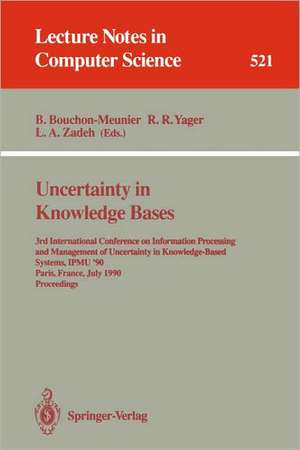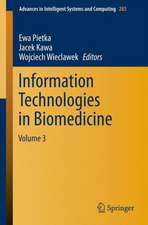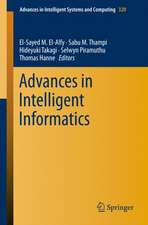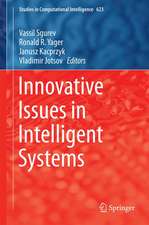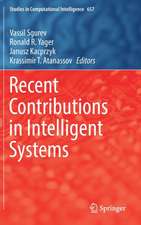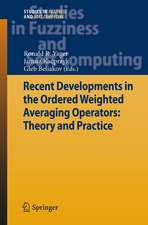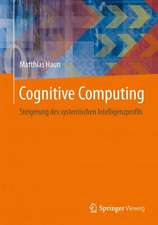Uncertainty in Knowledge Bases: 3rd International Conference on Information Processing and Management of Uncertainty in Knowledge-Based Systems, IPMU'90, Paris, France, July 2 - 6, 1990. Proceedings: Lecture Notes in Computer Science, cartea 521
Editat de Bernadette Bouchon-Meunier, Ronald R. Yager, Lotfi A. Zadehen Limba Engleză Paperback – 11 sep 1991
Din seria Lecture Notes in Computer Science
- 20%
 Preț: 1061.55 lei
Preț: 1061.55 lei - 20%
 Preț: 307.71 lei
Preț: 307.71 lei - 20%
 Preț: 438.69 lei
Preț: 438.69 lei - 20%
 Preț: 579.30 lei
Preț: 579.30 lei -
 Preț: 410.88 lei
Preț: 410.88 lei - 17%
 Preț: 427.22 lei
Preț: 427.22 lei - 20%
 Preț: 596.46 lei
Preț: 596.46 lei - 15%
 Preț: 448.04 lei
Preț: 448.04 lei - 20%
 Preț: 353.50 lei
Preț: 353.50 lei -
 Preț: 389.49 lei
Preț: 389.49 lei - 20%
 Preț: 309.90 lei
Preț: 309.90 lei - 20%
 Preț: 645.28 lei
Preț: 645.28 lei - 20%
 Preț: 763.23 lei
Preț: 763.23 lei - 15%
 Preț: 580.46 lei
Preț: 580.46 lei - 20%
 Preț: 310.28 lei
Preț: 310.28 lei - 20%
 Preț: 655.02 lei
Preț: 655.02 lei - 20%
 Preț: 1183.14 lei
Preț: 1183.14 lei - 20%
 Preț: 340.32 lei
Preț: 340.32 lei -
 Preț: 449.57 lei
Preț: 449.57 lei - 20%
 Preț: 591.51 lei
Preț: 591.51 lei - 18%
 Preț: 938.83 lei
Preț: 938.83 lei - 20%
 Preț: 337.00 lei
Preț: 337.00 lei - 20%
 Preț: 649.50 lei
Preț: 649.50 lei - 20%
 Preț: 607.40 lei
Preț: 607.40 lei - 20%
 Preț: 1414.79 lei
Preț: 1414.79 lei - 20%
 Preț: 1024.44 lei
Preț: 1024.44 lei - 20%
 Preț: 583.40 lei
Preț: 583.40 lei - 20%
 Preț: 453.32 lei
Preț: 453.32 lei - 20%
 Preț: 575.49 lei
Preț: 575.49 lei - 20%
 Preț: 1075.26 lei
Preț: 1075.26 lei - 20%
 Preț: 585.88 lei
Preț: 585.88 lei - 20%
 Preț: 825.93 lei
Preț: 825.93 lei - 17%
 Preț: 360.20 lei
Preț: 360.20 lei - 20%
 Preț: 763.23 lei
Preț: 763.23 lei - 20%
 Preț: 340.32 lei
Preț: 340.32 lei - 20%
 Preț: 504.58 lei
Preț: 504.58 lei - 20%
 Preț: 369.13 lei
Preț: 369.13 lei - 20%
 Preț: 580.93 lei
Preț: 580.93 lei - 20%
 Preț: 343.62 lei
Preț: 343.62 lei - 20%
 Preț: 350.21 lei
Preț: 350.21 lei - 20%
 Preț: 583.40 lei
Preț: 583.40 lei - 20%
 Preț: 583.40 lei
Preț: 583.40 lei - 15%
 Preț: 438.59 lei
Preț: 438.59 lei - 20%
 Preț: 341.95 lei
Preț: 341.95 lei - 20%
 Preț: 238.01 lei
Preț: 238.01 lei - 20%
 Preț: 538.30 lei
Preț: 538.30 lei
Preț: 661.65 lei
Preț vechi: 827.05 lei
-20% Nou
Puncte Express: 992
Preț estimativ în valută:
126.62€ • 131.71$ • 104.53£
126.62€ • 131.71$ • 104.53£
Carte tipărită la comandă
Livrare economică 14-28 aprilie
Preluare comenzi: 021 569.72.76
Specificații
ISBN-13: 9783540543466
ISBN-10: 3540543465
Pagini: 624
Ilustrații: X, 614 p.
Dimensiuni: 155 x 235 x 33 mm
Greutate: 0.86 kg
Ediția:1991
Editura: Springer Berlin, Heidelberg
Colecția Springer
Seria Lecture Notes in Computer Science
Locul publicării:Berlin, Heidelberg, Germany
ISBN-10: 3540543465
Pagini: 624
Ilustrații: X, 614 p.
Dimensiuni: 155 x 235 x 33 mm
Greutate: 0.86 kg
Ediția:1991
Editura: Springer Berlin, Heidelberg
Colecția Springer
Seria Lecture Notes in Computer Science
Locul publicării:Berlin, Heidelberg, Germany
Public țintă
ResearchCuprins
On Spohn's theory of epistemic beliefs.- Fast algorithms for Dempster-Shafer theory.- On the combination of information sources.- Application aspects of qualitative conditional independence.- A study of probabilities and belief functions under conflicting evidence: Comparisons and new methods.- Propagating belief functions through constraints systems.- Updating uncertain information.- Assessing multiple beliefs according to one body of evidence — Why it may be necessary, and how we might do it correctly.- Probabilistic default reasoning.- On knowledge representation in belief networks.- Stoss — A stochastic simulation system for Bayesian belief networks.- Conditional events with vague information in expert systems.- On representation of source reliability in weight of evidence.- An abstract mechanism for handling uncertainty.- A method to build membership functions.- Algebraic analysis of fuzzy indiscernibility.- On modelling fuzzy preference relations.- Conceptual conectivity analysis by means of fuzzy partitions.- Transitive solutions of relational equations on finite sets and linear lattices.- Generalized cardinal numbers and their ordering.- An interval-based approach for working with fuzzy numbers.- Beyond specificity.- About the logical interpretation of ambiguous inheritance hierarchies.- Nonmonotonic reasoning and modal logic, from negation as failure to default logic.- On the notion of uncertain belief revision systems.- Non-monotonic reasoning in a semantic network.- Inference in possibilistic hypergraphs.- Semantic evaluation in possibilistic logic application to min-max discrete optimisation problems.- Formalizing multiple-valued logics as institutions.- Empirical plausible reasoning by multiple-valued logic.- Time, tense, and relativity revisited.-Information and the mind-body problem.- A general information for fuzzy sets.- Information theory based on fuzzy (possibilistic) rules.- Measuring uncertainty given imprecise attribute values.- Discrimination by optimizing a local consistency criterion.- Minimum loss of information and image segmentation.- Towards a general theory of evidential reasoning.- A pragmatic way out of the maze of uncertainty measures.- Models for reasoning with multitype uncertainty in expert systems.- A hybrid belief system for doubtful agents.- How to reason with uncertain knowledge.- Computation and uncertainty in regulated synergetic machines.- Inductive learning from incomplete and imprecise examples.- Some algorithms for evaluating fuzzy relational queries.- Time and incompleteness in a deductive database.- An approach to the linguistic summarization of data.- Management of uncertainty in the attachment problem in natural language processing.- A topological approach to some cluster methods.- A fuzzy knowledge-based system for biomedical image interpretation.- Management of caotic systems with the model for the regulation of agonistic antagonistic couples.- Fuzzy multicriteria techniques: An application to transport planning.- Fuzzy logic approach to modelling in ecosystem research.- An application of fuzzy multi-criteria decision making for topological design of large networks.- A distance measure for decision making in uncertain domains.- Decisions and lack of precision in crop management: The role of processing both objects and procedures through semantic networks.- A neural network expert system with confidence measurements.- Dealing with uncertainty in a distributed expert system architecture.- The combinatorial neural network: A connectionist model for knowledge based systems.- Amedical decision aid based on a neural network model.- A fuzzy neuron based upon maximum entropy ordered weighted averaging.
